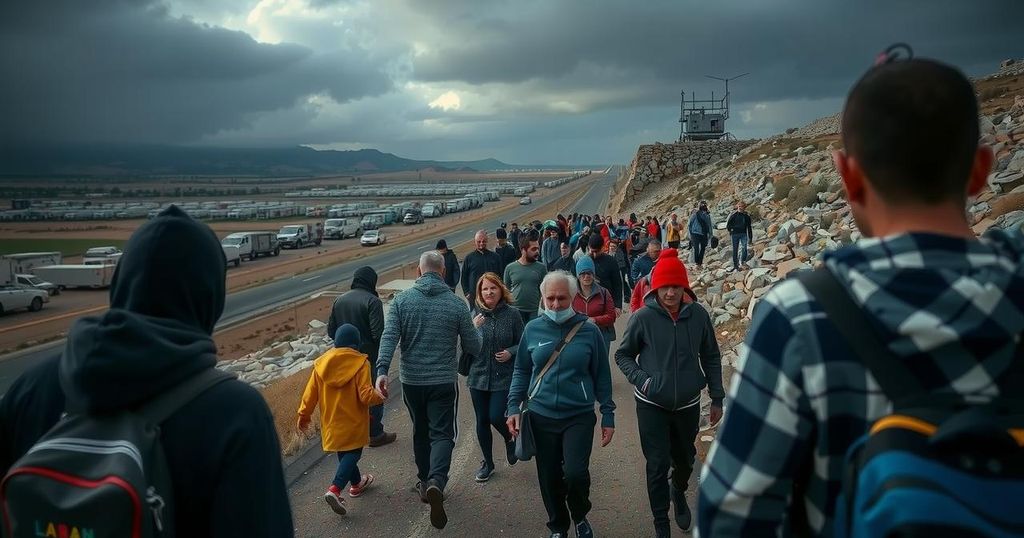Lebanese refugees displaced by the Israel-Hezbollah conflict are returning to southern Lebanon after a ceasefire was reached. Over 20,000 had sought refuge in Iraq, and roughly 800 individuals are returning weekly, despite concerns about damage to their homes and a lack of infrastructure. Support from the Iraqi government has assisted these families, but uncertainty about their future in Lebanon remains a significant concern.
Lebanese families who fled to Iraq due to the ongoing hostilities between Israel and Hezbollah have commenced their return to southern Lebanon following a recent ceasefire agreement. Many individuals, including Ali Abdulla, expressed their determination to return to their homeland despite the extensive destruction of their homes. Abdulla stated, “After two months, we are returning to our homeland. We will return even if we find our homes destroyed; we will sit on the ground.” Official data indicates that over 20,000 Lebanese sought refuge in Iraq since the conflict began, highlighting the magnitude of displacement caused by the violence.
Yousef Barakat, another returnee, shared his relief at the prospect of returning home. He noted, “Returning home was faster than we expected. A ceasefire has been achieved. We, the southerners, have not and will not abandon our land.” Currently, Najaf airport facilitates the return of approximately 800 Lebanese each week, although some are opting for bus transport to the Syrian border before proceeding to Lebanon. Increasing hostilities in Syria have hindered land travel, prompting a preference for air travel.
The Iraqi government and local Shi’ite institutions have provided crucial support by offering free accommodation, healthcare, and meals for displaced families during their stay in Iraq. However, not all individuals are ready to return. Some express concerns about returning to uninhabitable homes due to damage to essential infrastructure. Rabea Ali, a mother from southern Lebanon, articulated the plight of many families: “I no longer have a home; everything is destroyed. If we return, where will we sleep, on the street? What is the future of our children if they stay in Lebanon? No education, no future, and no home.” This sentiment encapsulates the challenges faced by families contemplating their return to a war-torn homeland.
Meanwhile, some, like Rabea Ali’s son, Omar, have adapted to life in Iraq and are hesitant to return. Omar shared, “We ran from bombing and devastation. I’m working to collect enough cash to bring my family, who are stuck in Lebanon, to live together here.” In contrast, young Ali Hassan expressed a strong desire to return to Lebanon to reconnect with his school and visit the grave of a friend who perished in the conflict. He stated, “I hope to return to Lebanon to visit his grave and pray for him.” This juxtaposition underscores the mixed emotions surrounding the returns.
The ongoing conflict between Israel and Hezbollah has resulted in a significant humanitarian crisis in Lebanon, displacing thousands of families. Following the escalation of violence this past year, many Lebanese sought refuge in neighboring Iraq. Recently, a ceasefire brokered by the United States and France has provided a respite in hostilities, prompting many displaced families to contemplate returning home. While the ceasefire marks a positive development, the destruction and uncertainty in their homeland present significant challenges for returning families.
In summary, the return of Lebanese refugees from Iraq symbolizes a tentative step towards recovery in a conflict-ridden region. While the recent ceasefire facilitates this process, significant obstacles remain, including the destruction of homes and infrastructure, leading to fears among many families about the viability of returning. The experiences of both those who wish to return and those who prefer to remain in Iraq illustrate the complex emotions and considerations involved in the aftermath of the conflict.
Original Source: indianexpress.com






